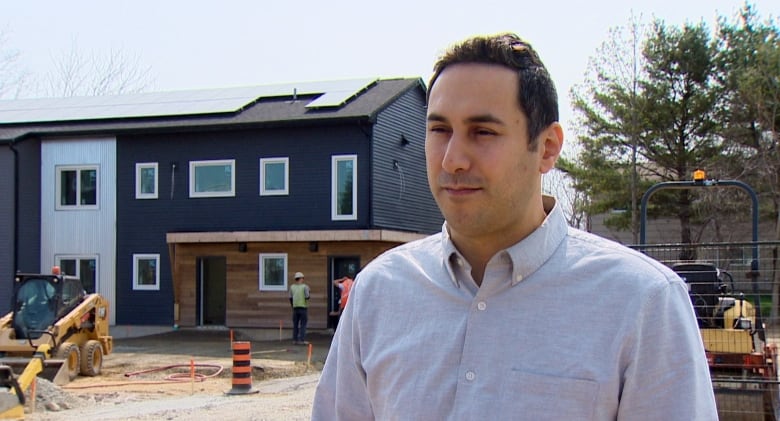Housing developers say they can't keep up with population growth in N.S. without big changes
There is a huge demand for housing in Nova Scotia, yet construction starts on new homes declined in 2022 compared to the year before. (David Laughlin/CBC)This story is part of an ongoing CBC Nova Scotia series examining how the province is managing its record-setting population boom after decades of limited growth.As the Nova Scotia government works toward doubling the province's population to two million by 2060, one question is front of mind for many: where will people live?Professionals from the construction and development industries say Nova Scotia isn't building enough housing quickly enough to meet current demand. They say conditions will need to shift dramatically for the province to accommodate continued population growth."That has to change," said Duncan Williams, president and CEO of the Construction Association of Nova Scotia. "We've set very aggressive immigration targets, which is wonderful, but we need places for them to live as well."'So many of us don't want to be here


This story is part of an ongoing CBC Nova Scotia series examining how the province is managing its record-setting population boom after decades of limited growth.
As the Nova Scotia government works toward doubling the province's population to two million by 2060, one question is front of mind for many: where will people live?
Professionals from the construction and development industries say Nova Scotia isn't building enough housing quickly enough to meet current demand. They say conditions will need to shift dramatically for the province to accommodate continued population growth.
"That has to change," said Duncan Williams, president and CEO of the Construction Association of Nova Scotia. "We've set very aggressive immigration targets, which is wonderful, but we need places for them to live as well."
After decades of stagnant or decreasing population, Nova Scotia's population has swelled in the past few years.
Driven largely by international immigration and people moving from other provinces, Nova Scotia has added nearly 111,000 new residents since 2015 — more than 10 per cent of the current population, which as of April 1, 2023, was 1,047,232.
But this increase in population has coincided with what provincial officials are calling a housing crisis. Vacancy rates are low, average rents are climbing, and homelessness is doubling in urban centres.
According to data from the Canada Mortgage and Housing Corporation, in the past five years Nova Scotia's housing starts peaked in 2021 at 5,310 units that year, then declined to 4,877 units last year.
This number represents new construction of single family homes, semi-detached and row homes, and apartments. Williams believes this number needs to triple.
"If we're going to see a doubling of the population, based on current composition of households, we would need to be in that 15,000 to 16,000 units per year across the province," he said. "So it would be quite a stark contrast to where we are today."
Premier 'accepts the challenges of growth'
Growth over the past year has been the fastest on record since 1951. And Nova Scotia's premier believes the province can keep it going.
"We need more people. Our demographics are not great. So doubling the population, for me, is about right-sizing our demographics. It's about making the province younger," Premier Tim Houston told CBC News in a July interview.
The province estimates that more than a quarter of Nova Scotians will be aged 65 and over by 2030.
The provincial government has said continued growth will bring in more tax revenue, new businesses and jobs, improved infrastructure and greater diversity.
But the challenges include an overburdened health-care system, schools that are overflowing and turning to portables and modulars, and more Nova Scotians struggling to afford to buy or rent a home.
Houston said he "accepts the challenges of growth," believing they can be overcome.
Both Houston and Housing Minister John Lohr have said the solution to the housing crisis lies in the hands of private and non-profit developers.
There are no current plans to build more government-owned public housing. Instead the province is focusing on investment in programs like the Community Housing Acquisition Program and the land for housing initiative to add affordable housing to the market.
Houston said another way to combat the shortage of housing is to train and attract more tradespeople.
Barriers to development
In a report released last week, the Canada Mortgage Housing Corporation concluded to fix the affordability gap, Nova Scotia needs 70,000 more new units of housing by 2030, on top of what is already in the works.
But developers say it's not that easy. The biggest barriers to achieving this are labour shortages, higher interest rates and the rising cost of construction.
"In the last number of years we've started and completed more housing units in Halifax than ever before," said Michael Kabalen, executive director of the Affordable Housing Association of Nova Scotia, a non-profit developer. "Yet it's still not enough and in fact we're starting to see a decline in the number of new starts and new units."
Kabalen said non-profit developers face challenges like lengthy approval processes and raising enough money to meet the requirements for government funding.
"When the non-profit is actually ready to submit and pull their loan from a government program ... we're often waiting seven, eight, nine months just to hear back."

Private developers are facing similar challenges. Peter Polley, owner of Polycorp Group, said bureaucracy and taxes are some of the biggest issues in his business.
He said he's sitting on a plan to build high-density housing near Halifax, with some units at affordable prices, because he can't get approval.
"This isn't rocket science. We're not putting a man on the moon.... We're building houses," Polley said. "It shouldn't be this complicated."
Last week, the federal government said it would remove the Goods and Services Tax (GST) from the construction of new rental apartments to spur new development.
Federal Housing Minister Sean Fraser wrote to Nova Scotia Premier Tim Houston on Thursday to urge the removal of the provincial portion of the Harmonized Sales Tax (HST) from rental home construction. The Nova Scotia government has yet to respond.
Though developers have called for tax incentives like this, they still hope for more solutions. Kabalen said it's going to take all levels of government, as well as non-profit and private developers, to work together to combat the crisis.
"We didn't do anything for a long time, and I think we need to get past that," Kabalen said. "So the first thing we need to do differently is stop trying to assign blame and start ... laying claim to what our share of the solution is going to be."
What's Your Reaction?



















